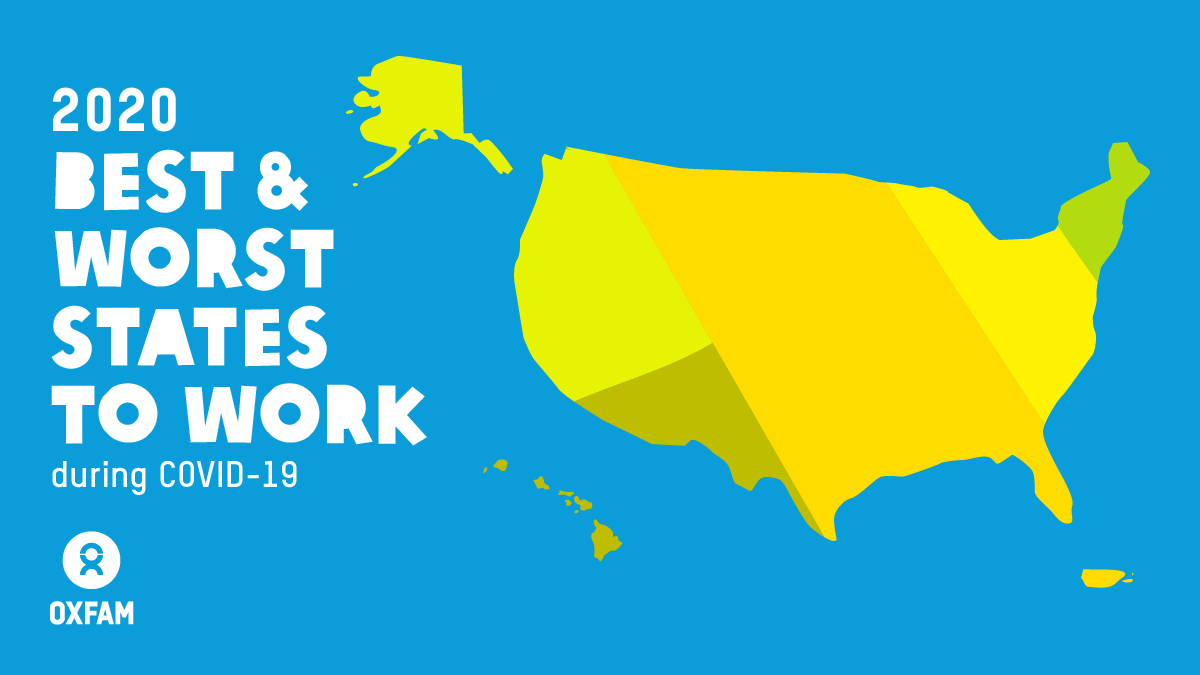Oxfam ranks states (and territories) on how they’re supporting working families and responding to residents’ needs during this pandemic.
Oxfam has released a Best States to Work Index the last two years that assesses conditions for workers around the country. With the alarming and devastating spread of COVID-19, this year Oxfam created the Best States to Work During COVID-19 Index, which focuses on how US states, as well as the District of Columbia and Puerto Rico, are supporting residents as they cope with the impacts of the virus.
We ranked states and territories in three major areas: worker protections—whether states are taking proactive measures to keep workers and communities safe; health care policies—how states are protecting the health of their residents during a pandemic given the limitations of employment-linked health insurance—and unemployment supports, such as housing and food assistance.
The best states to work
Washington
Though our scores have little correlation to rates of infection, the state where the first US case of the coronavirus was detected also happens to be at the top our list. Washington is number 1 for unemployment supports. In August, the governor set up a relief fund for people who can’t access federal stimulus programs because of their immigration status.
New Jersey
New Jersey is one of only two states—the other is Connecticut—that mandates a grace period for making rent payments.
California
California ranks number 1 for worker protections. It was the first state to extend unemployment benefits to undocumented workers.
Massachusetts
The minimum weekly unemployment payment here is $240 and the maximum is $823 (compared to the lowest maximum, $190 in Puerto Rico).
Connecticut
It is the only state to implement all three housing protections: moratoriums on evictions and utilities shut-offs, and rent forgiveness.

The worst states to work
Alabama
At the bottom of our list, at number 52, is Alabama, where the minimum weekly unemployment payment is $145 and the maximum is $275. Alabama has no moratorium on evictions or utilities being shut off; no mandated paid sick or family leave; and no requirements for personal protective equipment for workers. In addition, the governor issued an executive order to protect businesses and health care providers from lawsuits resulting from COVID-19.
Missouri
The minimum weekly unemployment payment is $178 and the maximum is $320. The state offers few worker protections against COVID-19 and no housing assistance.
Georgia
This state—where Gov. Brian Kemp overturned a mask mandate in July—is tied with Mississippi for last place when it comes to offering worker protections. Neither state mandates pregnancy accommodations, paid family leave, or paid sick leave, or protects against sexual harassment or retaliation.
Wyoming
The state comes in at 48 for worker protections with no face mask regulations or mandated paid sick leave.
Mississippi
The maximum weekly unemployment payment is $235 in the state, meaning that the most someone on unemployment will have to live off for a month would be less than $1000. Imagine trying to feed your family, meet your rent or mortgage payment, and pay all your bills on that alone.
In doing our research, we found that every state has room to improve policies that will protect working people, especially in reaction to COVID-19.
We call on states to:
- Improve worker protections to ensure paid sick time, paid family and medical leave programs, and childcare for all workers
- Expand Medicaid
- Increase unemployment payments

